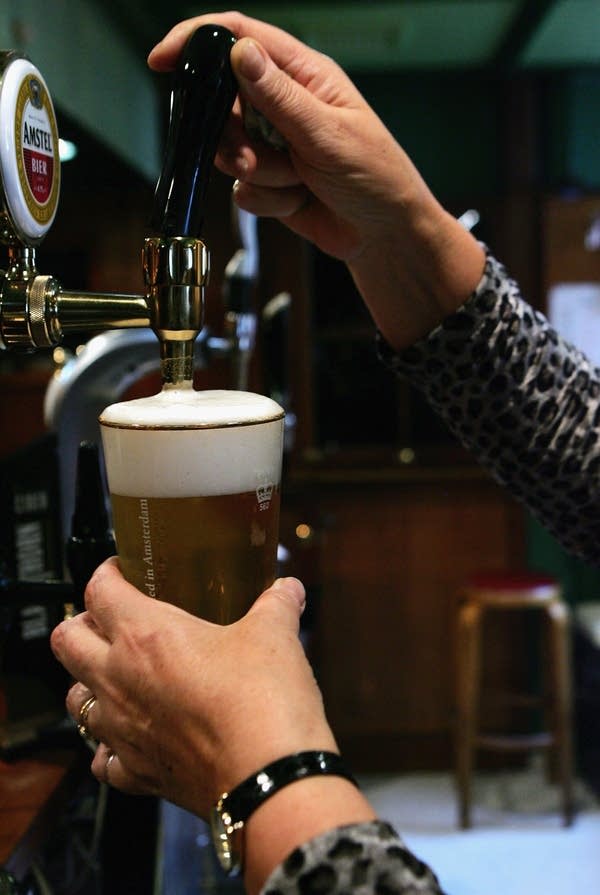U of M study: Stadium beer vendors too lax
Go Deeper.
Create an account or log in to save stories.
Like this?
Thanks for liking this story! We have added it to a list of your favorite stories.

The study was like a police sting operation. Researchers sent young-looking people and actors who appeared drunk to 16 sports stadiums in five states. Specific locations were not disclosed.
Traci Toomey was in charge of the study. She's an associate professor in the School of Public Health at the University of Minnesota.
"The people that appeared to be underage, they asked for a beer, and if they were asked for any age identification, they truthfully said they did not have any age identification with them. That was part of the research protocol, that they did not carry it on them," said Toomey. "If they were asked their age, they gave their real age, but the bottom line is the servers -- we didn't try to convince them to sell to the buyers."

The young-looking actors got their beer 18 percent of the time. The actors who played drunk were served three out of four times.
Turn Up Your Support
MPR News helps you turn down the noise and build shared understanding. Turn up your support for this public resource and keep trusted journalism accessible to all.
In Minnesota, it's illegal to furnish alcohol to anyone who's obviously intoxicated.
Where the actors were trying to buy beer mattered as well. A sale was nearly three times more likely to occur from a vendor in the stands as at the concession booth.
Toomy says it's much harder for vendors to screen their customers in the seating areas.
"It's physically demanding. Many people are waving them down to buy alcohol, they're trying to stay out of the way of the viewing of other fans," said Toomey. "The people who are asking for the alcohol may be five or 10 seats down the row from them, so I think it's very hard to make an assessment of whether this person looks under age or that this person looks obviously intoxicated."
"The proper serving of alcohol takes precedence over the tips that [our servers] would get."
Also, there may not be a supervisor nearby to back up a vendor who tries to refuse a sale.
Toomey says she didn't look into whether or not a vendor's financial incentive to make a sale was a factor.
The study recommends that vendors should carefully check ID for anyone who appears under 30. And they should take the time to talk with anyone who looks like they may have already had enough.
"Do they smell like alcohol, are they repeating themselves, do they act confused, are they stumbling or fumbling with their money," Toomey said. "It's really having enough interaction with them to make a judgment whether they think this person is impaired or not."
The people who operate the concessions at Minnesota's pro stadiums say they train their workers to do exactly those things.
Centerplate is the catering company that serves the Metrodome and the Xcel Energy Center. Spokeswoman Gael Doer says the financial incentive for vendors to sell takes second place to following the rules.
"The proper serving of alcohol takes precedence over the tips that they would get," said Doer. "I think our servers understand that this is a serious issue -- that they should not sell to underage people, and that they have to monitor the amount of alcohol that they may be selling to somebody who may be showing signs of intoxication."
The operations director at the Metrodome agrees. Dennis Alfton says the stadium has revamped its alcohol policies over the last couple of years.
"We ask for IDs for anyone under 30 years old who are being served at the concession stands, and we swipe that card to ensure that they are of legal age to purchase," said Alfton. "We've reduced the number of beers that people get, especially at university games. We serve one beer per person, especially in the student sections."
And any employee found to serve alcohol to an underage fan is fired immediately.
In the seating area, the vendors check the buyer's ID, but they don't have the equipment to swipe the card to verify age.
Alfton says the Metrodome has passed the city's undercover compliance checks for the last several years.
Researcher Traci Toomey says her study shows there's still room for improvement.
"People who are already obviously intoxicated are at risk of problems and contributing to problems. We don't need them to become even more intoxicated, and have a greater likelihood of contributing to problems related to alcohol."
Toomey says research should be done on how many underage people are buying alcohol at sporting events.
Her study appears in the upcoming issue of the journal, Alcoholism: Clinical & Experimental Research. It was funded by the Robert Wood Johnson Foundation.
Dear reader,
Political debates with family or friends can get heated. But what if there was a way to handle them better?
You can learn how to have civil political conversations with our new e-book!
Download our free e-book, Talking Sense: Have Hard Political Conversations, Better, and learn how to talk without the tension.





